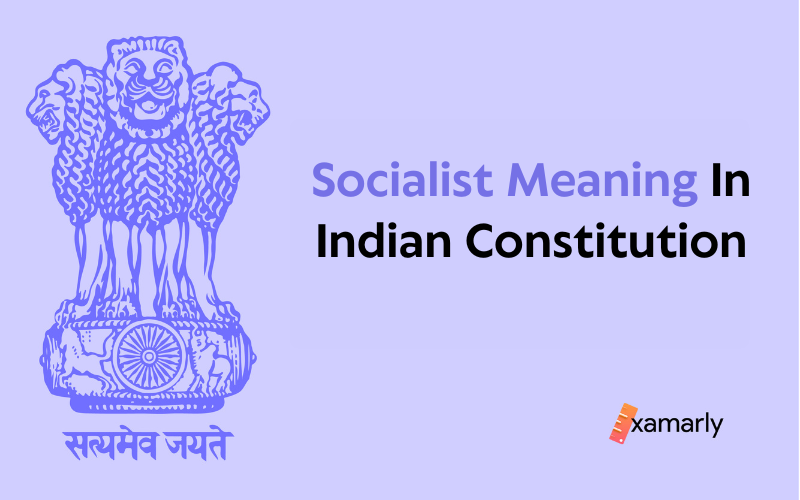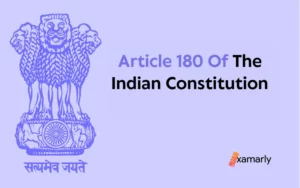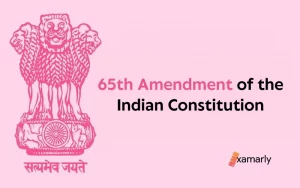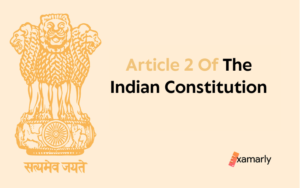India is home to a diverse class of people who not only reside here but their fundamental rights are protected by the Indian Constitution. The ultimate goal is to have a society without discrimination.
Originally, the preamble did not contain the word “socialist.” It was included in the 1976 Constitution as part of the 42nd Amendment. Though the socialist meaning in Indian Constitution is not stated, it does not refer to doctrinaire socialism that insists on state ownership as a matter of policy. It does not imply total state control over the nation’s material resources or the exclusion of private enterprise.
Read this article further to learn more about the term socialist in the preamble of the indian constitution. This article will help you to figure out why was socialist added to the Indian constitution, its advantages, and disadvantages, and its characteristics.
This article is a part of the Indian Polity of UPSC Syllabus, so candidates preparing for the UPSC exam must read it.
- Socialist Meaning In Indian Constitution
- When Was Socialist And Secular Added To Indian Constitution?
- Why Were "Secular" And "Socialist" Added To Indian Constitution?
- What Are The Main Characteristics Of Socialism?
- Advantages And Disadvantages Of Socialism
- Socialist Principles In Indian Constitution
- Conclusion
- FAQs On Meaning Of Socialist In Indian Constitution
Socialist Meaning In Indian Constitution
The term “socialist” embodies social and economic equality in the true sense. Social equality entails discouraging discrimination based on caste, creed, color, religion, sex, language, etc. Every citizen of the country has the right to equal status and opportunities. On the other hand, economic equality is an attempt to ensure that the Government does everything in its power to make the distribution of wealth and resources equal and also, to provide a decent standard of living for every citizen of our country.
When Was Socialist And Secular Added To Indian Constitution?
The term “socialist” has not been part of the Constitution since the beginning. They were added to the Preamble as part of the 42nd Amendment of the Indian Constitution in 1976. It was during that time Emergency was declared in India under the Prime Ministership of Indira Gandhi. However, this term has been surrounded by controversy, and its removal from the Preamble is being sought.
The main argument that was put forth was that this term was never intended to be part of the Constitution in the first place. In addition to that, such inclusion is out of the limits of the authority accorded to the Parliament under Article 368 and the basic structure of the Preamble cannot be hampered.
Why Were “Secular” And “Socialist” Added To Indian Constitution?
For the inclusion of the terms “secular” and “socialist”, there were numerous debates in the Constituent Assembly. Members like KT Shah and Brajeshwar Prasad had raised the demand for the inclusion of the two terms in the Preamble.
However, Dr. B R Ambedkar vehemently argued against this saying that the social and economic side of matters is supposed to be decided by the people based on time and circumstances. The above demand was an infringement on the constitution of democracy. He contended that the change that was being sought through the amendment was already a part of the draft Preamble.
The Constitution originally included several ideas endorsing socialism and secularism. For instance, the Directive Principles of State Policy are supposed to direct the actions of the government. A similar Indian version of secularism is observed in the fundamental freedoms that permit the freedom to practice and advance one’s religion. It is also evident in the governmental policies that acknowledge religious occasions across communities. The Indian state has throughout the years recognized and engaged itself in topics connected to all religions. This is in stark contrast to western secularism which rigidly separates the state from religion.
What Are The Main Characteristics Of Socialism?
Under the socialist system, the sources of production and economic activities have a single ownership. These are owned by the Government. In this arrangement, the people jointly own the production through their government. Private landlords and industrial owners do not exist. The State conducts all commerce, and all earnings go to the state’s fund.
The following are some crucial aspects of socialism:
- Role of the State – The State’s position will be more all-encompassing, and it will have an impact on every aspect of public life. The sources of production are accumulated by the State. It chooses the areas of various businesses and carries them out in compliance with priorities.
- Central Planning – The distribution of production resources is based on detailed planning. Any authority has influence over the central planning responsibility.
- Social Ownership on the Means of Production – The means of production are not owned by the capitalists in a socialist economy. The means of production are used for the benefit of society and are owned by the State. The State acts to improve people’s living conditions.
- Economic and Social Quality – The socialist system does not take into account family, caste, or property rights when distributing income and opportunities.
- Goal of Social Welfare – The primary focus of economic activity is social well-being along with making profits. The State produces in accordance with citizens’ demands for consumption.
- Freedom of Consumption and Production – Customers are free to choose from a variety of options. Additionally, the manufacture is done in accordance with consumer demands. The employees are allowed to improve the business as they see fit.
- Labour as Trustees and Employee – Workers play a similar role to trustees and employees. They are allowed to take part in management. All of their opinions, thoughts, and proposals are taken into account when making management decisions.
- Others – This includes the following.
- The market mechanism develops as a controlled and active price system.
- The dignity of the worker exists in a relationship with the means of production. It does not lie in the form of a factor of production.
- The products of the socialist economy are well thought out and reasonable as it works to promote public welfare.
- Distribution based on functions.
- All consumer goods are privately owned.
The following links provide access to additional material that candidates can read to prepare for their competitive exams:
Advantages And Disadvantages Of Socialism
Advantages Of Socialism
- Socialism helps such a society thrive which treats economic equality as a priority.
- In capitalist societies that emphasize the development of hybrid services, the number of hidden taxes is declining.
- Redistribution of income can help to curb poverty in society.
- Socialism can perform its role when the constituents of capitalism are made a part of its structure.
- It promotes better standards of living, healthcare that is universal in nature, and economic growth that keeps improving.
- With access to free healthcare, the basic care needed to lead a healthy life can be availed by everyone.
- Public ownership renders a lot of benefits for a socialist society.
- It enables the agency to prioritize the interests of the public instead of increasing profits for shareholders.
- Socialism can increase the productivity of labor in beneficial as well as detrimental ways.
- Social cohesion is put at the forefront as the welfare of everyone is looked after. Socialism emphasizes working for the common good.
- The ease at which environmental safeguards can be placed increases.
- Regulation for the reduction of pollution is an action that can be taken as an advantage of socialism.
- The chances of fixing prices in capitalist societies reduce to a great extent.
- Socialism serves as a helping hand for an efficient economy.
- The necessity to sell unwanted goods or services to customers is not felt in the structure of socialism.
Disadvantages Of Socialism
- In the setup of socialism, a higher tax burden is imposed on individuals.
- When a country’s economy has progressive taxation with a high rate, there are greater challenges to employment and running a business.
- Due to the fact that they do not possess actual ownership, entrepreneurs lack the desire to work.
- Socialism rarely provides any opportunity for an individual.
- The formation of a welfare state may have a negative impact on industrial incentives.
- Overly generous welfare states under socialist governments deter people from working.
- Governments can be ineffective when it comes to controlling industries or running businesses.
- Job opportunities decline with the imposition of strict guidelines on industries by the socialist government.
- This in turn can also hamper structural employment.
- Such a situation arises when the skills of the workforce and the requirements of the employer do not align.
- The gap between the workers and the owners can be increased by the unions in socialist nations.
- It lessens the chances for innovation in society. In a socialist-style government, production frequently puts internal needs ahead of fresh prospects.
- There are greater levels of bureaucracy under socialism. Additionally, it compels the government to handle all expenditures.
Socialist Principles In Indian Constitution
- These principles are the worldview of socialism.
- They create the foundation for a democratic socialist state. They promote social and economic equality and lay the groundwork for a welfare state.
Conclusion
Though absent from the Constitution, “socialist” does not propose doctrinaire socialism in the sense of pressing on state ownership as a matter of policy. It does not imply total state control over the nation’s material resources or the rejection of private enterprise.
Jawaharlal Nehru advocated a system of a mixed economy. It would facilitate individual freedom, centralized-social control, and an arrangement for the economic life of the citizens.
The ultimate aim of socialism is to establish a point where equality of status and equality of opportunity is maintained.
Social, economic, and political equality must be ensured to strengthen the backbone of democracy. After all, the concept of society should be egalitarian as per the basic structure of our constitution and the basic principles of socialism help to move in that direction.
A sincere effort is needed in direction of eradicating the various discriminations from society and paving way for a class-less society. Prejudice in no form based on income and economic status should be encouraged.
A happy and progressive standard of life is what we as a society are striving for. This is where the principles of socialism come into the picture.
FAQs On Meaning Of Socialist In Indian Constitution
What Does Indian Constitution’s Term “Socialist” Refer To?
The term “socialist” was added to the Indian Constitution by the 42nd Amendment in 1976. The term refers to the fulfillment of socialist goals through the usage of democratic methods. It believes in the concept of a mixed economy. Private and public sectors co-exist in a mixed economy.
What Do You Mean By The Term Socialist?
The term “socialist” refers to a number of economic and political theories. These theories support shared or centralized control over the means of production and distribution of products.
Was India A Socialist Country?
By the enactment of the 42nd Amendment, in 1976, the term “socialist” became part of the Preamble of the Indian Constitution. This was brought about with the motive of ensuring social and economic equality. Social equality means that no citizen can be discriminated against on the grounds of caste, creed, sex, religion, color, language, etc.
What Is The Aim Of Socialism?
The 42nd Amendment Act, passed in 1976, adds the word “Socialist” to the Preamble. It states that the State owes citizens a duty to ensure their well-being, end discrimination, nationalize the means of production, distribute wealth equally, and uphold justice for everyone. The Directive Principles of State Policy heavily incorporate the Socialism Principles.
When Was Socialist And Secular Added To Indian Constitution?
Secular and socialist in the preamble of the indian constitution were added in the year 1992. 42nd amendment included it in the constitution of India.






